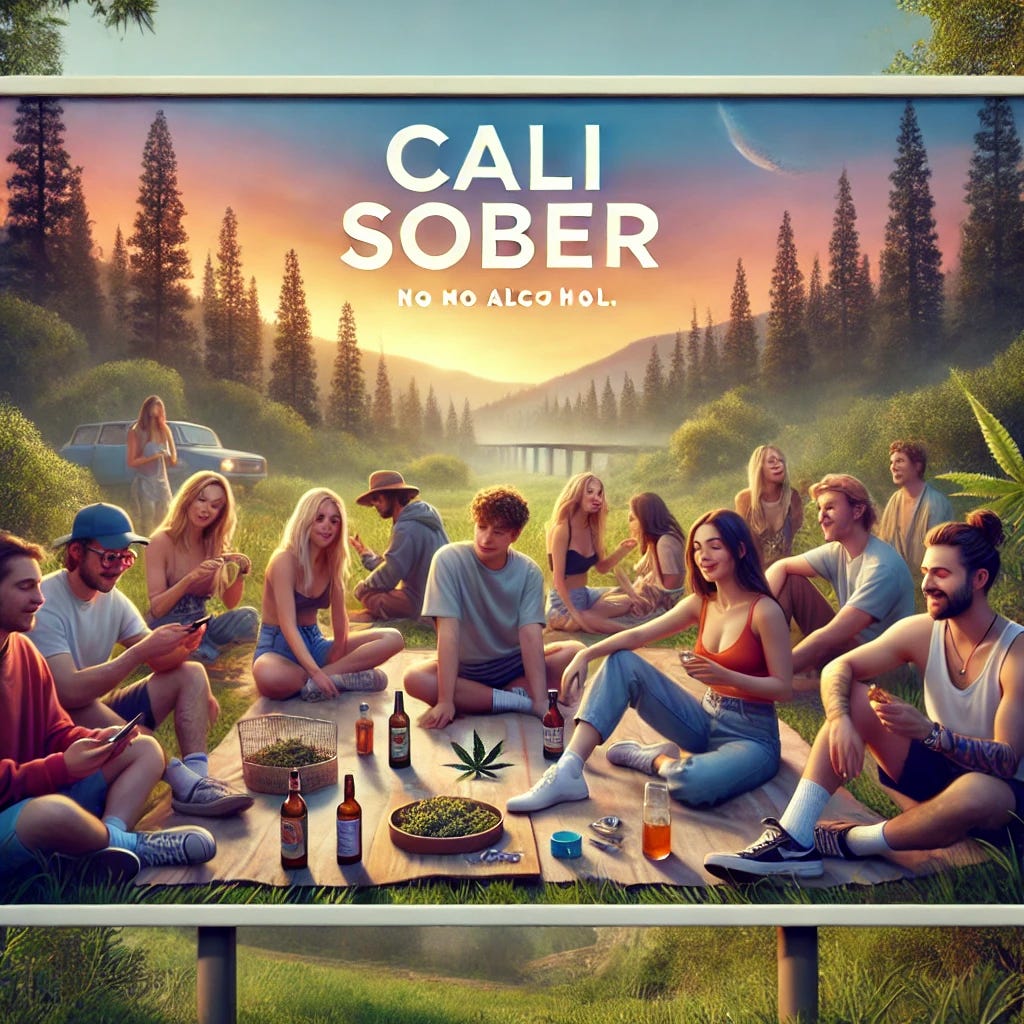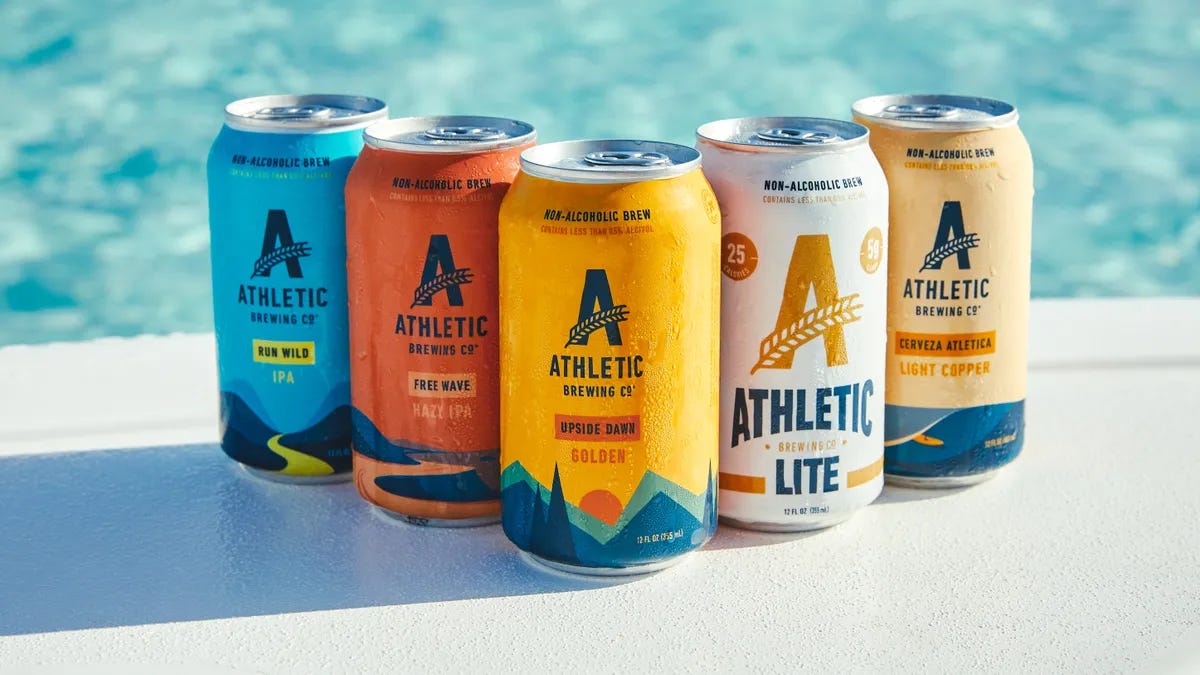“I’m Cali Sober,” she said. I was confused. I’d recently moved to Los Angeles and had never heard this term.
Cali Sober, as I learned, typically means you don’t drink alcohol, but cannabis and psychedelics are allowed. Some people call it LA Sober. It’s become a common lifestyle choice in Southern California.
The term Cali Sober can be traced back to a 2019 Vice article, by a writer who quit all drugs except marijuana and certain psychedelics when she moved from New York to California.
Demi Lovato recorded a 2021 song called “Cali Sober.” (Lovato later disavowed her Cali sober ways and now says she’s “sober sober.”)
Living in LA, I noticed more people I met were non-drinkers. Cannabis, on the other hand, was everywhere. So was psilocybin, the psychoactive compound in mushrooms. I started going to more LA events where no alcohol was served, but cannabis and psychedelics were used openly.
I noticed a rise in alcohol-free events, from Daybreaker (an early-morning event series that invites you to “open your heart and connect with people”) to Coffee and Chill, a social wellness community powered by cold plunges and caffeine.
I started to rethink my own relationship with alcohol. When I lived in New York and worked on Wall Street, I’d fallen into some bad habits. It seemed normal to have 3 or 4 drinks with friends after work.
These days I rarely drink alcohol. I’ve found other ways to socialize and unwind. I haven’t had a drink in months.
I’ve spoken to health experts to learn more about the trend in sober living — what’s driving it and where it’s going.
TL;DR: The decline in alcohol consumption is reshaping social habits and cultural norms. It’s opening up new business opportunities and sparking innovation in industries ranging from beverages to technology and hospitality.
Why are People Drinking Less?
Gen Z is leading the charge in alcohol abstinence. Over 60% haven't had a drink in six months. What's driving this shift? Screen time, health awareness, and the increasing popularity of cannabis all play a role.
Screen time
Young people today socialize more online and less in person. Many in Generation Z came of drinking age during the pandemic, when there were fewer opportunities to go out and experiment with alcohol.
Health
There’s growing awareness of the health risks of alcohol. Between 2005 and 2023, the percentage of Americans who see moderate drinking as bad for you jumped from 22% to 39%. Andrew Huberman’s podcast episode on alcohol in 2022 was among the most downloaded podcasts of the year.
Cannabis
For many young people, THC has replaced alcohol as the drug of choice. Pot is more readily available in different forms than ever before.
We’re seeing a generational shift in vices: Marijuana, vape pens and pills are up; alcohol and tobacco are down.
Pop Culture has Embraced Sobriety
From celebrities to TV shows to music festivals like Coachella, booze-free living is entering the zeitgeist.
Young celebrities like Billie Eilish are touting the benefits of sobriety. Celebs like Blake Lively, Bella Hadid, and Katy Perry have launched their own nonalcoholic beverage brands.
Netflix’s hit show Emily in Paris this year featured a storyline about booze-free cocktails. (Despite stereotypes of French culture, nonalcoholic beverages are on the rise in France.)
Music festivals are offering more no-booze beverages. Lollapalooza, Austin City Limits and Bonnaroo festivals provide nonalcoholic drinks at every bar. Tennessee’s Bonnaroo has a sober camping area called SoberRoo.
The New Bar, Venice's first nonalcoholic bottle shop, last year became the first official nonalcoholic partner for Coachella and Stagecoach, a country music festival, serving booze-free wine, beer and cocktails to concert-goers.
Beverages are Going Zero Proof
The beverage industry is adapting fast. Non-alcoholic beer, wine, and spirits sales jumped 35% in 2023.
Athletic Brewing. the king of nonalcoholic beers in the US, is now Whole Foods' top-selling beer — including the ones with alcohol.
Wine consumption is declining. One of the biggest US wine producers just filed for bankruptcy.
Nonalcoholic beer sales are soaring. The trend is even bigger in Europe, where nonalcoholic beer sales are 5.8% of total beer sales, compared with 0.9% in the US.
The latest generation of nonalcoholic beers taste a lot more like traditional beer, thanks to improvements in brewing technology.
Sober-friendly bars have opened in cities like New York, Miami, Austin, Denver, and San Francisco. More bars and restaurants serve nonalcoholic beers and a special menu of mocktails.
A nonalcoholic cocktail bar called Stay opened this year in Los Angeles, joining a number of similar bars and bottle shops across the city.
(Q: What’s a LA Martini? A: Athletic Greens AG1 sprinkled into a chilled glass of Liquid Death mountain water.)
New brick-and-mortar stores like Bardelia are dedicated solely to selling nonalcoholic drinks.
Are we witnessing a revolution in social drinking?
The fast-growing category of THC beverages has created new competition for both alcoholic and nonalcoholic drinks at liquor stores. Cannabis consumption lounges in LA are serving guests THC root beer.
I think we’ll see more THC drink brands like Cann emerge as social beverages. We’ll see more drinks like Kin Euphorics — beverages infused with adaptogens, CBD, or other natural ingredients that promote relaxation or focus without the intoxication of alcohol.
Sober Dating is Getting Easier
Dating without drinking? It's becoming mainstream. New apps like Drybaby cater to the sober crowd. Tea houses and cooking classes are replacing bars for first dates. How will this change relationship dynamics?
Sober dating can be a challenge. With no liquid courage, it’s harder for some people to date and be intimate.
Many popular dating apps now let users specify how much they drink (or use other substances) and filter matches based on these lifestyle habits.
A new crop of dating apps like Loosid, ClubPillar and Drybaby is explicitly targeting singles who don’t drink.
I spoke with John Calaba, founder of Drybaby, a “community focused dating app for alcohol-free socializing.” He said:
“There is no clear alternative in the marketplace right now to the ‘let's grab a drink’ social scene. Drybaby is an inclusive community catering to all types of users, from sober, sober curious, to mindful drinkers. As we like to say, you can be a weekday drybaby and a weekend warrior and still be considered part of our tribe.”
I spoke about sober dating with Sam Bail, the founder of Third Place Bar NYC (check out her newsletter). She recommends finding creative alternatives to the bar scene:
“I've been really obsessed with tea houses lately. There's something so wonderful and delicate about sharing a pot of tea and desserts together in a calm environment, rather than having to shout over loud music at a busy bar.”
In cities like New York and LA, there’s a growing number of IRL dating events that aren’t centered around drinking. Think cooking classes, book clubs, run clubs, and hiking groups. (My NYC in LA group crowdsourced this list of sober-friendly community groups in Los Angeles.)
New books and podcasts are helping people navigate alcohol-free dating. Tawny Lara (aka the Sober Sexpert) published a book about sober dating and relationships called “Dry Humping.”
We may see a rise in intimacy workshops like Held or The Feels — programs that support booze-free daters by helping them get comfortable in their bodies and teach them how to connect with other people without alcohol.
Alcohol-Free Gatherings Heat Up
More nightlife options don’t revolve around drinking.
Nonalcoholic pop-up bar experiences like Zero Proofed and Absence of Proof host booze-free events and curate cocktail kits and bar programs in a variety of cities.
Zero Proofed has upcoming events in Seattle and Los Angeles. The New Bar shares a list of alcohol-free events in LA and San Francisco.
Sam started hosting events in NYC with Third Place Bar to normalize not drinking — to provide a space for people who are booze-free and allow them to make authentic connections, without having to justify why they’re sober.
Sam said:
“I want not drinking to be looked at as normal, like being vegetarian, or not smoking. I'm excited to see more alcohol-free options on regular menus at bars and restaurants. It's great to know that not drinking is no longer considered weird or unusual, but that hospitality is embracing mindful drinkers as just another group of customers that are looking for attractive options.”
What’s the future of non-alcohol socializing?
It could be more things like kava lounges and elixir bars — gathering spots that don’t revolve around alcohol. Sober bars that feature artisanal mocktails, live music, trivia or karaoke.
The Rise of Sober Apps
Alcohol reduction apps, telemedicine programs, and sober community platforms are on the rise.
Most people have heard of Alcoholics Anonymous, or A.A. The program has been helping people get sober for over 80 years. Now entrepreneurs are taking the principles of A.A. and turning them into apps and online communities.
Sam of Third Place Bar recently shared a sober-curious starter kit: Books, podcasts, apps, and online communities that support a zero-proof lifestyle. Some of my favorites are Sober Glow, Beyond Liquid Courage, and Newly Sober.
I think we’ll see more tech-based approaches to helping people get sober:
Telemedicine programs for people looking to reduce their alcohol intake that combine human health coaches with AI chatbots and tools to promote healthy behavior change
Community Apps like I Am Sober that create digital communities around the sober-curious movement, helping users find alcohol-free events and venues
The Future of Sober Living
Is alcohol following the path of cigarettes?
Thanks to a successful decades-long public health campaign, smoking rates in the US are at historically low levels. In 1945, nearly half the country smoked. Today, the number is around 10%.
Cigarettes are less prominent in popular TV and film. Their cool factor has faded.
Could the same thing be happening with alcohol?
Well, not exactly. Alcohol isn’t going away. Alcohol is deeply entrenched in many of our cultures. Humans have been drinking for thousands of years. There’s undoubtedly some evolutionary value to drinking alcohol, from social bonding to mating.
Writer Kat Rosenfield wrote an illuminating piece arguing for the joys of alcohol — and how it brings its own special wisdom:
“The kids need to drink alcohol, make friends, and accidentally say ‘I love you.’”
Yet the evidence is clear. People today are drinking less. They’re more aware of the health benefits of quitting alcohol. They’re learning how to socialize without booze.
The sober curious movement is growing, supported by a new ecosystem of products, services, and communities.
It’s worth considering: How would society change if more people embraced sober living?
Thank you for reading this week’s edition of Vitamin Z.
Until next time,
By Daniel Zahler
Hi there and thanks for reading. I created Vitamin Z to share my research on health and wellness, longevity and healthy aging, and ways to optimize cognitive, physical and emotional health. I serve as an advisor to Noom, a leading digital health company, and work with the world’s top healthcare and life sciences companies to develop innovative new solutions to improve health globally. I was trained as a research scientist at Harvard, and I serve as a GLG council member, where I advise global business leaders on healthcare and technology innovation.
Enjoyed your reading experience?










Love that more folks are choosing not to drink! My rebuttal to Kat’s op ed: https://danaleighlyons.substack.com/p/gen-z-drinking-less-alcohol
Thanks for the shout out!